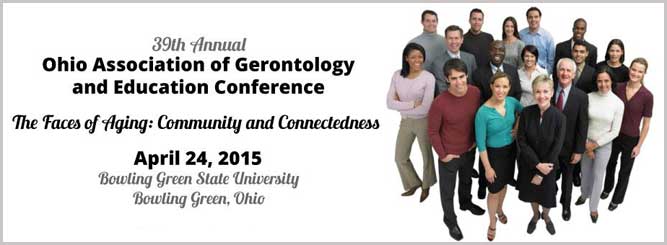Paper Session VI - Issues Affecting Caregiving
Event Title
Connection through Communication between Alzheimer's Family Caregivers and Care Recipients and Caregiver Well-Being Outcomes
Location
BTSU 308
Start Date
24-4-2015 1:45 PM
End Date
24-4-2015 2:45 PM
Description
The communication problems and aphasic symptoms that stem from the progressive degenerative nature of Alzheimer’s disease and related dementias are well documented. What is less well known and what the research below aims to explore is how caregivers interact with their ill family members and how those communication behaviors can impact multiple facets of health and well-being. As part of a larger data set for a doctoral dissertation, self-reports from caregivers about their own communication behaviors were divided into two subscales: a) the use of communication to understand the care recipient (ex. Asking yes/no, verifying, guessing, interpreting, etc.) and b) the use of communication to convey messages to the care recipient (ex. repeating, checking for understanding, speaking very slowly, etc.). Regression analyses indicated that both types of communication were significantly related to levels of depression and stress, such that the frequency of reported communication behaviors was positively associated with self-reported levels of depression and stress. These findings suggest that more interaction between the caregiver and the care recipient does not equate to better outcomes, at least for the family caregiver. Regression analyses also revealed significant findings between the two caregiver communication subscales and the age of the caregiver, the number of hours spent providing care, and the stages of Alzheimer’s disease. The results of this research have important implications for informing interventions and educational programs for family caregivers as it relates directly to communication with their family member suffering from dementia.
Connection through Communication between Alzheimer's Family Caregivers and Care Recipients and Caregiver Well-Being Outcomes
BTSU 308
The communication problems and aphasic symptoms that stem from the progressive degenerative nature of Alzheimer’s disease and related dementias are well documented. What is less well known and what the research below aims to explore is how caregivers interact with their ill family members and how those communication behaviors can impact multiple facets of health and well-being. As part of a larger data set for a doctoral dissertation, self-reports from caregivers about their own communication behaviors were divided into two subscales: a) the use of communication to understand the care recipient (ex. Asking yes/no, verifying, guessing, interpreting, etc.) and b) the use of communication to convey messages to the care recipient (ex. repeating, checking for understanding, speaking very slowly, etc.). Regression analyses indicated that both types of communication were significantly related to levels of depression and stress, such that the frequency of reported communication behaviors was positively associated with self-reported levels of depression and stress. These findings suggest that more interaction between the caregiver and the care recipient does not equate to better outcomes, at least for the family caregiver. Regression analyses also revealed significant findings between the two caregiver communication subscales and the age of the caregiver, the number of hours spent providing care, and the stages of Alzheimer’s disease. The results of this research have important implications for informing interventions and educational programs for family caregivers as it relates directly to communication with their family member suffering from dementia.


